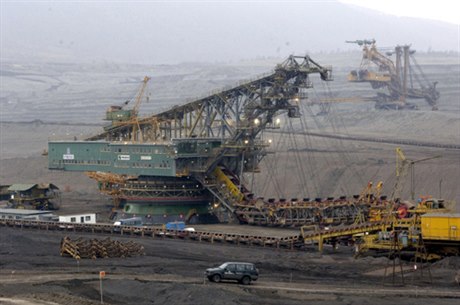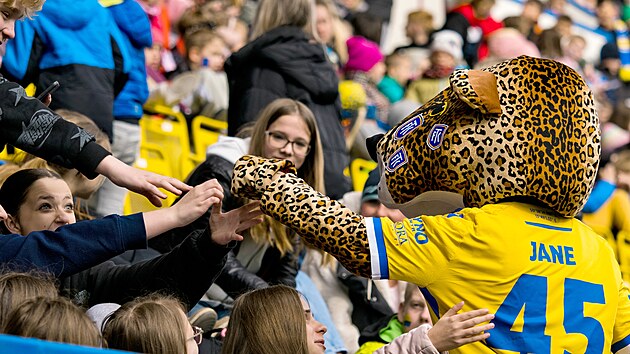The Czech Coal group produces roughly a third of all the country’s brown coal. On Dec. 15 Pavel Tykač, who up until then owned 50 percent of the company, signed a contract with the other co-owners of Czech Coal, Petr Pudil and Vasil Bobela, to buy out the remaining 50 percent for Kč 10.3 billion.
Tykač, through the privately-owned investment company Indoverse, has become sole owner of Most’s brown coal mines, which are key suppliers to the Czech market. This transaction will have a fundamental impact on the Czech brown coal market and on heat and power production.
There are three brown-coal mining companies in the country: Severočeské doly, Sokolovská uhelná and Czech Coal (formerly Mostecká uhelná). However, the first two companies burn the majority of production in their power stations (in the case of Severočeské doly in the power station of its owner ČEZ, the state-controlled utility), so Tykač’s coal is crucial for the market. With a total production of 45 million tons of brown coal in 2009, Czech Coal makes up 32 percent of the market. The pressure for a higher price brought Czech Coal into open war with the ČEZ group and United Energy
Czech Coal has for years been trying to increase the sale price of its coal and, because the majority of customers have refused to accept this, it hasn’t signed any significant long-term contracts recently. The pressure for a higher price brought it into open war with the ČEZ group and United Energy.
Czech Coal has been close to reaching a compromise with ČEZ three times now, but never got around to actually closing it. A year ago, the company verged on exchanging the Počerady power station in North Bohemia for the ČSA mine, which would give Czech Coal a power station to burn its coal in and ČEZ access to coal for its other power stations.
A few months ago, it looked like Czech Coal and ČEZ could burn coal jointly in the Počerady power station. Czech Coal was to have supplied coal for free, ČEZ was to have run the power station for free, and both companies were to have split the revenues from electricity sales by roughly half and half.
Both of these possible agreements, which were not signed in the end, indicate where the core of the dispute between the two giants lies. The miners’ profit margins are several orders lower than those of the electricity companies. A joint company or an exchange of assets should bring Czech Coal to roughly the same high profits from every ton of coal as ČEZ has.
According to Czech Position’s information, then-co-owners Pudil and Bobela were willing to make greater compromises during negotiations with ČEZ and they wanted to sign the agreement. Apparently, Tykač insisted that either they get well paid for the coal or he just won’t sell it and that Czech Coal is not in such a bad position that it has to rush.
Why the hurry?
The differences in the approaches shown by Tykač on the one hand, and Pudil and Bobela on the other were a logical outcome of their different investments and life situations. While Tykač has been one of the richest Czechs for almost 15 years now, having bought half of the Most area mines with his own money and not owing anyone a thing, Pudil and Bobela went into debt to buy shares from Antonín Koláček and Luboš Měkota.
Both had payment schedules and needed Czech Coal to generate significant profits to pay off their debts. A long-term agreement with ČEZ would have given Pudil and Bobela the security to pay off their loans without problems leaving them unencumbered coal barons. However, Tykač has other motivations. He can wait much longer and thus negotiate much harder. Czech Coal will likely press even harder for strong growth in lignite prices
He will now be the one making all of the key decisions for Most’s mines. For roughly Kč 20 billion Tykač will gain a 100 percent share in Czech Coal and the right to mine and sell hundreds of millions of tons of brown coal.
Czech Coal will likely press even more for significant growth in brown coal prices so that its profit margins from a ton of coal are roughly equal with those of the heat and power stations. If customers won’t accept the high price then Czech Coal can lower production and wait.
Tykač is not buying the mines with a bank loan or with hidden investors’ money. He hasn’t been to the stock market for financing and so is under no pressure to sell at lower prices and maximize production so that he can return the financing or show investors good results every quarter. His time horizon is different because his life is not dependent on money from the coal.
This could change the philosophy of the entire sector. This resource, of which there is little of with regards to the needs of heat production, took millions of years to form. If Czech Coal leaves it in the ground for another couple of years or decades it won’t do it any harm. The likelihood of a fall in the price of rival heat and energy commodity natural gas is low. So the owner of brown coal can easily start asking for twice the price and wait.
And that is what is happening. A financially independent owner doesn’t have to rush into selling his coal. The era of cheap brown coal that heat and power stations remember from the 1990s and start of the new millennium is at an end. The profits of heat and power stations will fall and everyone will appreciate coal all the more.





